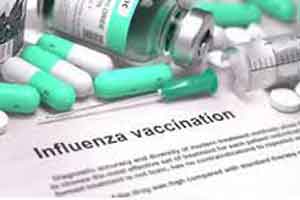- Home
- Editorial
- News
- Practice Guidelines
- Anesthesiology Guidelines
- Cancer Guidelines
- Cardiac Sciences Guidelines
- Critical Care Guidelines
- Dentistry Guidelines
- Dermatology Guidelines
- Diabetes and Endo Guidelines
- Diagnostics Guidelines
- ENT Guidelines
- Featured Practice Guidelines
- Gastroenterology Guidelines
- Geriatrics Guidelines
- Medicine Guidelines
- Nephrology Guidelines
- Neurosciences Guidelines
- Obs and Gynae Guidelines
- Ophthalmology Guidelines
- Orthopaedics Guidelines
- Paediatrics Guidelines
- Psychiatry Guidelines
- Pulmonology Guidelines
- Radiology Guidelines
- Surgery Guidelines
- Urology Guidelines
ACOG Updates Guidelines on influenza vaccination during pregnancy

Pregnant women are particularly vulnerable to influenza infection and its resulting morbidities; therefore, influenza vaccination is an integral element of pre-pregnancy, prenatal, and postpartum care.The American College of Obstetricians and Gynecologists (ACOG) has released an updated Committee Opinion and recommendations for influenza vaccination during pregnancy.The recommendations have been developed in collaboration with the Centers for Disease Control and Prevention's Advisory Committee on Immunization Practices:
- All adults should be vaccinated against influenza, using the inactivated formulation; the inactivated vaccine is safe throughout pregnancy.
- Given the importance of immunization in expecting mothers and their fetuses, obstetrician-gynecologists should advocate for influenza vaccination.
- Obstetrician-gynecologists should have the vaccine available for administration during clinic visits. Furthermore, they should maintain an up-to-date influenza vaccination status.
- If obstetrician-gynecologists do not stock the influenza vaccine at their clinic, they should provide referrals to appropriate centers.
- Office staff should also maintain up-to-date influenza vaccination status.
Individuals who have experienced hives from egg exposure may receive influenza vaccinations without restriction. - Individuals who have had serious allergic reactions to eggs should receive the vaccine in a medical setting.
- Patients with possible influenza, assessed by clinical evaluation, should be treated immediately with appropriate antiviral medications, regardless of whether they have received the influenza vaccine. Awaiting test results should not delay administration.
- Women who are pregnant or postpartum (up to 2 weeks) should receive postexposure antiviral chemoprophylaxis, if necessary. Oseltamivir 75 mg or zanamivir inhalations, each once per day for 10 days, may be administered.
This report endorsed the safety and efficacy of influenza vaccinations for pregnant women, based on recent studies.
It is imperative that all stake holders obstetrician-gynecologists, other healthcare providers, healthcare organizations, and public health officials should continue their efforts to improve the rate of influenza vaccination among pregnant women which will benefit women and their newborns.
For further reference log on to :
https://www.acog.org/Clinical-Guidance-and-Publications/Committee-Opinions/Committee-on-Obstetric-Practice/Influenza-Vaccination-During-Pregnancy

Disclaimer: This site is primarily intended for healthcare professionals. Any content/information on this website does not replace the advice of medical and/or health professionals and should not be construed as medical/diagnostic advice/endorsement or prescription. Use of this site is subject to our terms of use, privacy policy, advertisement policy. © 2020 Minerva Medical Treatment Pvt Ltd